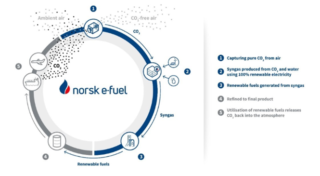-
Europe’s first commercial plant for hydrogen-based aviation fuel planned
Date posted:
-
-
-
Post Author
Philip SharmanIFRF Director
-
-
![]()
Norsk e-Fuel, a consortium of energy and engineering companies headquartered in Oslo, is planning to build Europe’s first commercial plant for hydrogen-based renewable aviation fuel. The consortium, comprising German renewable energy company Gunfire GmbH, Swiss direct air carbon capture technology company Climeworks, global engineering EPC group Paul Wurth SA (SMS Group) and Norwegian green investment company Valinor (parent company of Norsk Vind, the largest private wind power developer in Norway), plan to make unlimited renewable fuel a reality to achieve climate-neutral transportation. The Norsk e-Fuel ‘power-to-liquid’ (PtL) plant will be located in Porsgrunn and will generate renewable aviation fuel from carbon dioxide and water using 100% renewable electricity – the output of the first plant will provide enough fuel to halve the CO2 emissions of the top five domestic aviation routes in Norway. The new state-of-the-art project will allow the conversion of Norway’s extensive renewable electricity resources into renewable fuels.
“We are proud to have the best industry players including our Norwegian business partners on our side to realise this important project,” said Norsk e-Fuel General Manager, Karl Hauptmeier. “Together, we combine the necessary corporate strength with the most advanced and efficient technologies to convert Norway’s extensive resources of wind- and hydro–power into renewable fuels.” At present, the European transport sector is still heavily reliant on fossil fuels. This new project holds the promise for a radical change towards climate-neutral transportation – especially for hard-to-electrify sectors such as the aviation industry.
Using a single–step co-electrolysis process, the innovative technologies of Sunfire and Climeworks convert renewable electricity, water and CO2 captured from ambient air and unavoidable CO2 sources into syngas. Renewable fuels, such as jet fuel, are then produced through further processing and refining. The certified end–products can be used directly in existing infrastructure.
“The potential for this project is staggering. Norsk e-Fuel makes the supply of renewable fuel possible on a scale that is larger than has ever been achieved before – something that is crucial if we are to make global transportation truly sustainable. We are glad to contribute our direct air capture technology and know-how to help create renewable crude together with our partners,” adds Climeworks co-founder and co-CEO Christoph Gebald.
The first plant (with an annual production capacity of 10 million litres) will go into operation in 2023. This plant will then be up–scaled 10-fold to produce 100 million litres of renewable fuel before 2026. The Herøya plant will save 250,000 tonnes of CO2 emissions from industries such as the aviation industry every year. The upcaled, industrial–sized plant will then serve as blueprint for a nationwide roll-out of the project. “To put this in perspective, only one industrial scale plant will already provide enough blended renewable fuel for the top five domestic aviation routes in Norway combined (Oslo-Trondheim, Oslo–Bergen, Oslo-Stavanger, Oslo-Tromso and Oslo-Bodo). This would effectively cut the current flight emissions between these cities by about 50 %,” explains Lars Helge Helvig, Founder of Valinor and Chairman of Norsk Vind.
The planning of the first plant, to be located at Herøya Industry Park in Porsgrunn, is already well underway. In addition to its vital infrastructure, the location in Herøya offers sufficient space for the planned up–scaling. Other locations for the subsequent nationwide roll–out have already been identified. In addition to generating a large number of jobs both locally and nationally, the Norsk e-Fuel initiative will be a catalyst for the creation of a new clean energy business sector in Norway. “Climate change and rising costs for CO2 emissions result in a growing market for renewable solutions. This new project holds broad possibilities for Norway and Europe, offering the key to a deeper decarbonisation than has ever been possible before. The energy transition is already progressing quickly in consumer facing sectors – it is time for the industry to step up and bring technologies to scale to decarbonise the sectors that power our societies behind the scenes,” says Georges Rassel, CEO of Paul Wurth.

